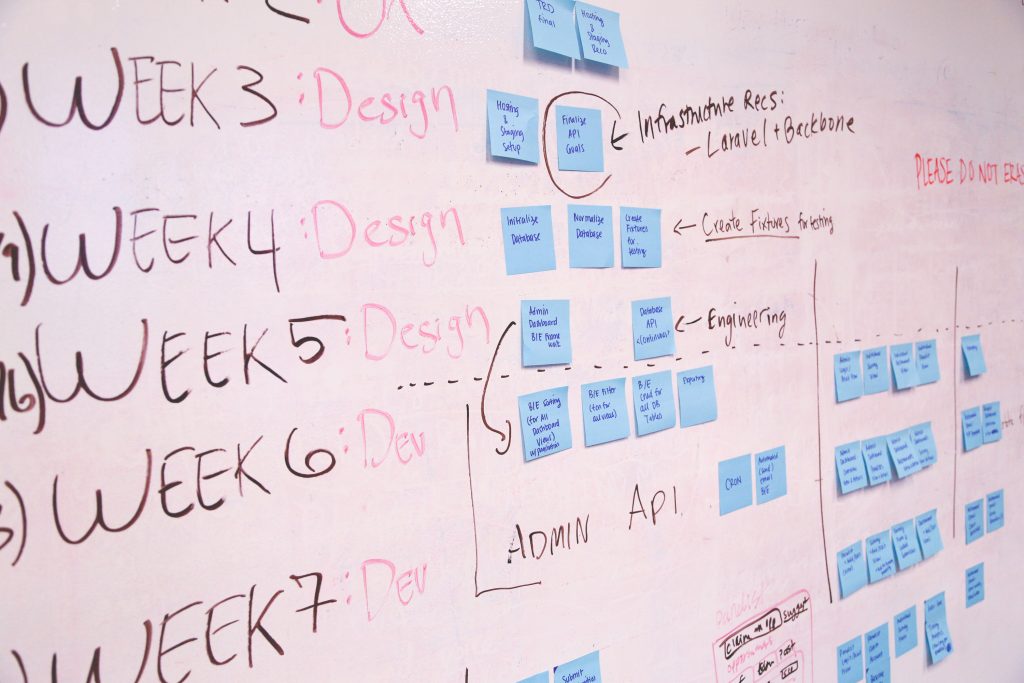
Do you often get stuck in ruts or have a hard time making decisions? Perhaps you get into analysis paralysis more often than you intend, or maybe you go through everyday motions without feeling like you’re moving forward? This is how you can get stuck in an unhealthy relationship for years, or work in a job for a decade before finally realizing you hated it all the time.
When a decision-making process is in the auxiliary, or what we like to call the Co-pilot position (Car Model), it takes conscious effort to engage it. Therefore, making a move can take forever and sometimes opportunities get missed because it does not come to us as naturally as our primary function, or Driver position. In this article, I want to talk about each of the decision-making (judging, not perceiving) processes and how they look when in the Co-pilot- or growth- position. These functions are Authenticity, Harmony, Accuracy and Effectiveness. Since I’m an INTJ, it’s only natural that I start this series with my own Co-pilot, Effectiveness.
The technical name for “Effectiveness ” is Extraverted Thinking, and it values sustainable systems, milestones and measurable information. In other words, it’s the ‘get shit done’ process. It gets things checked off the to-do list and makes sure you are meeting your goals. Since it’s in the Co-pilot position for both INTJs and ISTJs, it is a source of growth for us.
A Pitfall:
It seems easy to just leave it at that, right? Go do stuff! The thing is, there’s another process intertwined with it that can bring help or harm. This process is “Introverted Feeling,” or what we’ve nicknamed  “Authenticity.” This process is all about what feels right for us, what’s ethical, and what feelings are showing up. Every Effectiveness Co-pilot is always coupled with Authenticity in the 10 Year Old position. This means that we can sometimes get stuck in our feelings. The worst part is that, sometimes, that stuckness can pull us away from our Effectiveness process. It’s a constant push and pull, like the sea, and getting into our Co-pilot helps us bring in the tide. While Authenticity can feel nice and soothing at times, less nourishing water is available to us and there’s a risk of drought.
“Authenticity.” This process is all about what feels right for us, what’s ethical, and what feelings are showing up. Every Effectiveness Co-pilot is always coupled with Authenticity in the 10 Year Old position. This means that we can sometimes get stuck in our feelings. The worst part is that, sometimes, that stuckness can pull us away from our Effectiveness process. It’s a constant push and pull, like the sea, and getting into our Co-pilot helps us bring in the tide. While Authenticity can feel nice and soothing at times, less nourishing water is available to us and there’s a risk of drought.
Develop Your Co-Pilot:
So how exactly can we get into our Effectiveness process? I often hear others ask this question and people come up with very simple, straightforward answers. “Buy a daily planner! My ISTJ friend relies on it!” Or “My INTJ husband uses a color-coding system!”
Do you think this is all there is to the Effectiveness process?
I say the root of the problem is not being addressed. We need to ask WHY it’s difficult to get into our growth state. The answer lies in our tertiary, Authenticity.
What we need to do is not just go for socially-approved, arbitrary means of planning or what others think Effectiveness is. We need to do what feels right for us. Feed the 10 Year Old so they stop complaining, and then you can go do your business.
This means that you need to create the right system for you. What milestones do you think in naturally? Do you actually care if you start something by 9:30am? Are there particular events you prioritize? What things are most meaningful to you? What are the things you wish to do before you end up on your deathbed? What is the right path in the long run?
These are the questions you’ll need to answer before you can form your own authentically personal system. When it’s totally right for you, it will be sustainable.
And hey, maybe a daily planner DOES work for you. Maybe it doesn’t. That doesn’t make you any less INTJ or ISTJ. It means that you know what works for you and that’s a good thing.
I suggest doing some research. Try different organization techniques. Consult the people around you and see if they have ideas you hadn’t considered. Take in the options and design your own process by piecing methods together or by  making your own from scratch.
making your own from scratch.
If you tap into your Effectiveness process well, you’ll be able to maintain a stable source of energy and you’ll meet the meaningful goals that pertain to your life’s purpose.
When you really know what method works the best for you, you’ll be unstoppable.
Tangible actions:
- Read 7 Habits of Highly Effective People by Stephen Covey. This book is all about building sustainable systems in your life to meet your long-term goals no matter what your circumstances.
- Freewrite on a blank piece of paper. When you organize it, think about how you normally break apart information. Is it by steps? By ideas? By dates? By roles? This is probably the way you need to sort your goals as well.
- Start big and end small. Don’t think of what you’re going to do tomorrow or how you’ll organize your closet. Take those big dreams you have and see how you can break them down into manageable tasks that can be placed on a to-do list. Example: I want to write at least one novel in my life, so I will write 30 minutes everyday on 750words.com. Every Saturday, I’ll take an hour to learn about a particular writing technique to focus on for the following week of writing. Once I hit 50,000 words, then I’ll go into an editing phase for 30 minutes per day.
- Try on different systems for size. See how they fit. Do the daily planner thing and see if it’s right for you. Use blank paper. A graphic organizer. A digital app like Endnote. A whiteboard. Get into short-term relationships (or even casual one-night-stands) with these methods to sense their flavor. And if they mesh well with your own savory hue, then add it to your collection. If it’s a maybe, then perhaps it needs more of your own personal spice. Tweak it to your needs. Use only the necessary bits and pieces for specific occasions.
- Delegate a part of a project you’re currently working on to one of your friends. If you have a blog, invite your friend to write an article and set the parameters around it. This helps you set up a system that others can understand and creates milestones for both you and your team. It can be as small as explaining to your friend what kind of picture you’d like them to take. For example, I basically take a picture of them, show it to them, and say “That’s how I want you to do it. See this angle? And how the light hits?” Or it could be more in-depth like asking someone close to you to research something for you if you haven’t got the time to do it in that moment.
Decisions, Decisions…
Sometimes as tertiary Authenticity users, we can confuse what feels right with what feels good. It’s better to focus on what will be most effective in the long-term so we can make our best decisions.
As an INTJ, I tend to use pro/con lists most often. For example, my most recent relationship ended because I asked myself this: What are the benefits of staying in this particular situation? What positive or negative things would happen if I left? I made a list of each factor and used the 80-20 metric. It ended up looking a bit like this:
Pros
- We communicate well together
- He helps inspire me to be more proactive
- He cares a lot about me and respects me (because feminist men are awesome!)
Cons
- I have become a bit dependent on him.
- I feel too anxious and insecure in this relationship.
- I need more healing to do before getting into a long-term relationship because I don’t have enough to offer at the moment.
- My needs don’t match up with what he’s willing to give.
- This is long-distance and while I’m willing to commit to that, there is no mutual, concrete end-goal to look forward to.
- Our five-year trajectories into the future don’t match up.
- There’s no guarantee that we will be able to be physically together.
- Our communication recently has become too synthetic and in-genuine.
I decided that since about 80% of what I came up with indicated that leaving was best, then so be it. I planned for the breakup, anticipated what emotional turmoil might pop up and took measures to combat these things.
And did you notice that my Authenticity process snuck in a few words?
“I feel too anxious and insecure in this relationship.” Imagine if I didn’t bother making this list! What if the pros actually outweighed the cons and I totally made a drastic decision based on my insecurity! If I broke up with this guy in that way, I would have never known what could be and would spend the rest of my life second-guessing.
But because I was able to lay all of the elements on the table, I made an objective decision and will remember the reason why we broke up for the rest of my life. I sent him an email detailing these things and it was a calm endeavor. We still talk occasionally and there are no hard feelings because I was able to communicate my reasoning for wanting to part ways. We were able to talk it through and make a mutual decision about it.
If 80% of my list had more pros, I would’ve planned for the problem-solving. Maybe we would need therapy or a fresh perspective on things. Maybe I needed to do some changing and it was me who needed to open up and be more available to my partner. Don’t let your feelings get in the way. They can be a good source of guidance to lead you to possible options and solutions, but do not give them permission to make the decisions.
For ISTJs, I suggest being open to new experiences and then analyzing it in retrospect. Maybe there’s a new coworker and you’re concerned that they won’t do a good job. Test it out in real time. Work with them and delegate a few small tasks to see how they handle them. Make sure you keep an open line of communication during this process! Don’t let your feelings control your reactions. Speak up and problem solve. If your co-worker was late or forgot an important file, ask why. Don’t just assume the worst of them because that’s giving your Authenticity process permission to make decisions for you. Get that outside feedback so you can have a clear view of what’s going on. After maybe two weeks, think about what happened as objectively as possible. What kinds of challenges did this coworker face? Were they actually  incompetent as an employee, or are they just getting used to the new job? Were they doing their best to get the tasks done? Did their accomplishments outweigh their mistakes? Just as I mentioned for INTJs, let your Authenticity process guide you to possible conclusions, but do not let it make the final judgement.
incompetent as an employee, or are they just getting used to the new job? Were they doing their best to get the tasks done? Did their accomplishments outweigh their mistakes? Just as I mentioned for INTJs, let your Authenticity process guide you to possible conclusions, but do not let it make the final judgement.
Use any method in your arsenal that you think might work. Try a graphic organizer, consult your friends, write yourself an essay about the situation and try to view things as objectively as possible. What are the facts? Uncover them, list them, weigh them, and then decide.
Final notes:
As you’re deciding on which effective method is best for you, make sure you’re not avoiding certain things just because it feels hard or uncomfortable. It might take you a few tries to really find that sweet spot. Whatever method you choose, it must be flexible. Don’t let the plans run you, and don’t let the emotions call the shots. Effectiveness is all about long-term sustainability. So making sure the activities on your checklist are right for you and the decisions you make thoroughly thought through is an essential part of the process.
_________
When you’re ready, here are five ways we can help you grow…
1. Reclaim Authorship of Your Life (Free Audio): Become the Main Character Your Own Life
2. Regulate your Body, Emotions, Thoughts, & Intuition with Self-Regulation Mastery
3. Understand yourself at a deeper level with a Personality Owners Manual
4. Master the Art of “Deep Reading” people in Profiler Training
5. Rewire your Brain & Build a Life that Fits You in the Personality Life Path
Share:
Harmony: The Secret Weapon of the INFJ
Patterns and Causes of INFJ Wounding
38 comments
This pointless writing spent 10 minutes of my time. I can’t believe that so empty and useless article was written by an INTJ.
What a disappointment
This link is helpful:
https://www.reddit.com/r/intj/comments/v2ioq0/getting_out_of_the_intj_nifi_loop_strategies_and/?utm_source=share&utm_medium=ios_app&utm_name=iossmf
Emma: so glad to hear it!
Note to self: Funny (odd? Interesting?) that yet again, years after first reading this article and commenting on it, and without having looked at it much in the interim, here I am reading it again. and again, the article is interesring, useful and motivating. I’d love to further accelerate and sustain that. Doing that will require reflection, but also action. Rereading my post, I again see how useful and helpful it would be for it to feel good and right to take action in addition to it feeling good/right to learn and intuit/think more. My post seems an idea/effort to merge the two: to make action a way to feed my love of thinking with more information (I.e., results and reactions from the outside world) and render the action of deciding/doing less of a buzz kill by making it part of the much-loved Ni process. In short it’s a personality hack—but more than a hack, it’s me as INTJ doing what many of us likely do well: reframing the problem (inaction/looping) to solve it.
1) If for INTJS, looping is driven by feelings (immature Fi) …
2) …and if ineffective looping is driven by either (a) feelings that the action is not authentically me, (b) feelings of joy from engaging in Ni that we don’t want to “abandon” by taking action, or © fear b/c action carries some other type of threat or exposure
3) …then imagine how we can create a POSITIVE (e.g., effective) loop by (a) understanding, acknowledging and accepting our authentic selves as INTJs, (b) embrace the joy and skill we have with Ni, © reframe “taking action” as FEEDING Ni by providing the one type of information we cannot otherwise get without action: results and reactions. How incredibly effective might we then become not only at taking action—but even more so by upping our Ni game. Our Ni itself would be more effective, and our Fi should LOVE that b/c how much more authentically INTJ can that possibly be? This would be a “positive and powerful” loop…
Now, notice the word “would” in that last sentence. I am “ideating” and loving it (as an INTJ). This is all very fun, but also hypothetical. I find myself wanting to think about it more, because it feels incomplete and because I love thinking. But the reason it is incomplete (or one reason) is because I need results and reactions to really “know” if this is any good or at all helpful, and I cannot get those results/reactions without acting. I need to ACT in service of my Ni process as spilled into this post above.
Will I do it? Can I love the act of doing it? will I try to put this in place? What would it take? I can feel the Te wheels starting to turn… How can I sustain it? (As I ask that last question, I realize it is such an INTJ thing to ask). I want to give it a go, and I think it would be fun and more sustainable to do this with a small group, maybe in a curated forum where I can still be somewhat anonymous (I am still also a private person, still have my soft inner self to protect, as I’m sure other looping INTJs do…) just thinking out loud, but also feeling it’s time to act and have fun with this…
One more though: if this same INTJ loop mechanism we just described can (potentially) be so positive and effective, how does get knocked sideways and negative/ineffective?
Perhaps it’s that (false?) dichotomy between thinking and doing. Perhaps it’s all that feedback from non-INTJs that we are thinking to much or not deciding. Perhaps subconsciously what we take from that is not only some sort of general sense of being criticized, but also we subconsciously hear that thinking is “in the way” of acting and that acting means “stopping” the thing we love to do, which is thinking and intuiting. I now am starting to truly believe this dichotomy is false. I can bring actions into my larger Ni process. This false dichotomy may simply be born of others’ seeming lack of understanding of what we are doing when we are doing Ni, interpreting it as “in the way” of what from their perspective is a need to act in a different way, and telling us we are thinking to much and need to stop so we can act. We then internalize the dichotomy, when the reality is we are ALREADY taking action and feeding it into Ni (ALL Ni must start with at least some amount of experience), and the opportunity is to expand and integrate action and reflection further, not to turn one off or threaten it for sake of the “other”.
I now so want to figure out how to DO this, and in part to figure it out by actually trying and doing it… which itself seems to already indicate that it has some legs as the basis for a more awesome and integrated Ni-Te-Fi -feeding loop. Firing on all cylinders, so to speak (car model? How does Se fit? PH car model would say it’s best for the occasional playful experience, perhaps for taking a break every now and then… pun not intended but sort of fun…)
This is so helpful thank you!
JM: So how is it going?
Funny in a way, that all this time after writing that comment, I found myself back on this page. Appreciated reading your reply. Hope all well.